However, this petty quarrelling was nothing compared to the hullabaloo that broke out when Kundera published the novel that was to become his biggest success ever — The Unbearable Lightness of Being . In his biting travesty of the gloomy daily life in Czechoslovakia under normalization , Kundera managed to enrage both the communists as well as the dissidents. The red establishment reacted as expected, and attacked the novel for being artistic trash that didn’t hesitate to distort “socialist reality” just to achieve commercial success.
Amazingly enough, the dissidents this time fully agreed with their communist oppressors. In the novel, Kundera’s heroTomáš, a brilliant surgeon, was degraded to a window cleaner because of his support for the Prague Spring reformists. But Tomáš didn’t despair and used the advantages of his new profession (i.e., transparent windows) to conquer a veritable host of willing women. This, the dissidents objected, was definitely not the fate of Czechoslovakia’s persecuted! Actually, many of them were forced to work as window cleaners, so maybe the true reason for their rage was an uneasy feeling of being unsuccessful conquerors?
Anyway, the literary values of The Unbearable Lightness of Being may be arguable, but one thing remains undisputed: internationally, Kundera’s novel — and the screen version which followed some years later — shed more bad light on the Czechoslovak communist regime than any other artistic work in the 1980s.
Unfortunately, the Velvet Revolutiondidn’t smoothen the conflict. As a gesture of goodwill, Václav Havel, now as president, nominated Kundera for a state order for his literary merits. But instead of accepting his former opponent’s hand, the famous novelist sent his wife to the ceremony in the Prague Castle, while he himself, allegedly, strolled incognito around in the streets, hidden behind dark glasses and a false moustache.
The Ypsilon Theatre in Prague fared even worse when it decided to honour Kundera by staging one of his earliest plays. Only days before the premiere, the theatre’s managing director received a telegram from Paris: the author does not give his consent to the re-staging! In their enthusiasm, the Czech actors had failed to notice that Kundera some years earlier had conducted a strict revision of his earliest works and found some of them to be worthless.
Admittedly, an artist of Kundera’s calibre can allow himself eccentric behaviour, and the misunderstandings could certainly have been sorted out in a lengthy interview. The problem, however, is that Kundera, since the middle of the 1980s, has stubbornly refused to say a word to the press, let alone grant some journalist — Czech or foreign — an interview.
Do these entanglements sound very petty? After all, why should there be anything else between the author and the readers than his or her books? Well, the core of the problem lies elsewhere. In 1986, Kundera declared that he was a French writer, which obviously doesn’t point to what passport he is carrying, but to the language in which he is writing.
Since the author can’t stand the thought of letting somebody translate his French novels into his mother tongue, Czech readers who don’t speak foreign languages can forget about Kundera’s latest novels. And due to the fact that he has started revising all his earlier works, they haven’t got access to some of his most famous, Czech-written works — such as The Unbearable Lightness of Being — either.
In other words: Milan Kundera has, for different reasons, burnt every thinkable bridge to his former home country. For this, his former compatriots have rewarded him with grumpy and ostentatious oblivion.
“What’s happened to Franta, why did he leave our office?” a civil servant asks his colleague. “Oh, nothing much, there was only a lustre that fell on his head...”
To a foreigner, this joke might appear a bit cryptic, but to the Czechs, it’s clear enough: František was one of those who were registered in the archives of the communists’ feared secret police, the StB, as an agent, informer or collaborationist. And the chandelier that smashed his head was the Lustration Law , which rules that anybody who holds a senior position in the civil service, the army, the judicial system, the police, public broadcasting, the National Bank and companies controlled by the state, must prove the he or she is “Stb negative” .
In practice, this means that state employees request the Czech Ministry of Interior to issue a lustration certificate. If that certificate happens to be positive, they are mercilessly kicked out of their jobs. Of course, this also goes for the actual members of the old StB. Bar some allegedly irreplaceable specialists (the precise number has not been published) these estebáci have not been accepted by BIS , the Czech Republic’s new secret service. This might explain why so many of them have started careers as private and — thanks to their contacts from the olden days — often quite successful businessmen.
The Lustration Law was adopted by the then-Czechoslovak parliament in 1991. Its purpose was quite obvious: to cleanse the democratic state’s civil apparatus of those persons who had let themselves be used as tools for the totalitarian regime. This is also reflected by the law’s name — lustrum was a cleansing ceremony, which the old Romans conducted every fifth year.
Even though it was never explicitly stated, the Lustration Law worked as a kind of moral settlement as well. Those who for some reason or other (see: Communism) couldn’t bear the pressure from the StB and started informing on their colleagues, neighbours, friends etc., have been, at least symbolically, punished. “We don’t want you to go to jail, but, on the other hand, because of your collaboration, you’ve lost the moral credibility required for holding an important post in the civil service,” is the Lustration Law’s underlying message.
With the somewhat expected exception of the communists, the Lustration Law gained broad support in the Czech population (the Slovaks, on the other hand, scrapped it after the separation of Czechoslovakia, while the Polesadopted a less rigid law almost a decade after the Czechs). But those who looked forward to a massive cleansing of the public sector have been disappointed. Of the more than 400,000 lustration certificates that the Ministry of Interior so far has issued, less than 5 percent have actually been positive.
Of course, the real number of StB informers was at least four times higher, but many of those who knew they were positive logically haven’t bothered to ask for a certificate. In other cases, people who knew they would not pass the screening simply found a suitable excuse to leave their jobs silently.
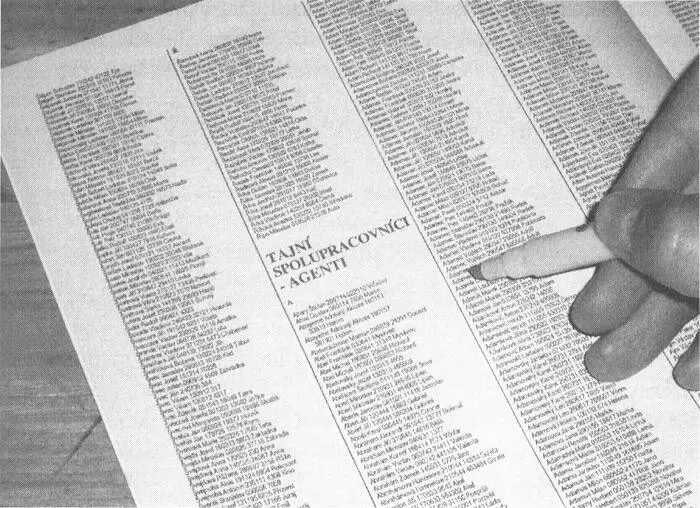
Photo © Terje B. Englund
So, does the Lustration Law, almost a decade and a half after it was adopted, serve any purpose? Not if you ask the Council of Europe or the International Labour Organization.
Both of these foreign institutions condemn the law, maintaining that it’s unjust and discrimination to a part of the population. Even prominent ex-dissidents, such as Václav Havel, oppose the law as a manifestation of the outdated Berufsverbot , which was practiced by the communists. As the Polish ex-dissident Adam Michnik puts it: “I was brave under the communists, so I don’t have to be brave now when they’re gone.”
In one respect, the lustration opponents undeniably have a convincing point: the Czech Ministry of Interior has issued more than hundred negative certificates to people who evidently were positive. And, vice-versa, persons who apparently never conscientiously collaborated have been stamped as “StB positive” just because some swindling secret policeman claimed rewards for having acquired “agents” who not had the faintest idea that they had been recruited.
Читать дальше
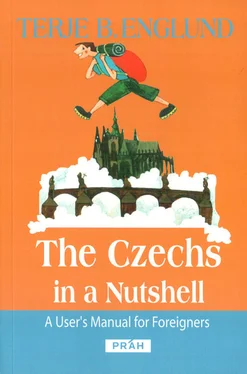


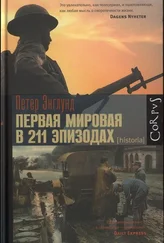

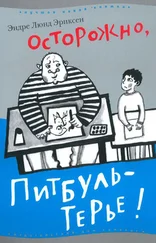
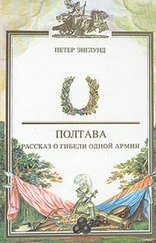


![Theresa Cheung - The Dream Dictionary from A to Z [Revised edition] - The Ultimate A–Z to Interpret the Secrets of Your Dreams](/books/692092/theresa-cheung-the-dream-dictionary-from-a-to-z-r-thumb.webp)



